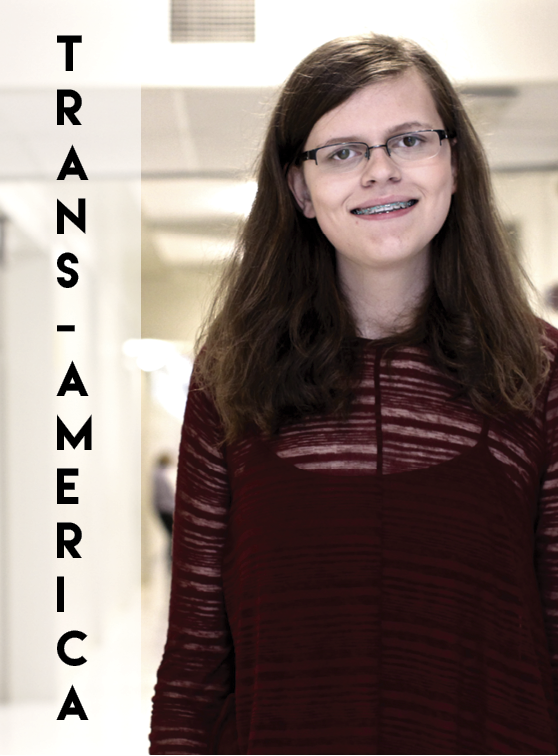Trans-America
Two transgender students share their experiences with family, friends and society
September 30, 2015
For decades, the LGBT (Lesbian, Gay, Bisexual, and Transgender) community has been vying for not only social acceptance, but a world where men and women of all sexual orientations and gender identities will not be scrutinized.
Originally the initialism was just LGB, but the “T” was adopted in the mid 1990’s. It stands for transgender, which means someone who identifies as a gender other than the one they were assigned at birth.
Although the two are grouped together, gender identity and sexual orientation are very different things and are independent of one another. Sexual orientation is who a person is attracted to, but gender identity is what they classify themselves as.
Over the past couple of decades, different sexual orientations have become more widely known and socially accepted. But alternative gender identities are still relatively new to the public eye, and social acceptance is in the early stages.
A transwoman is someone who has transition from male to female, whereas a transman has transitioned from female to male.
West has over 1,800 students, so it’s not surprising that a few are transgender. Claire Nation, sophomore, and Oliver Cochener, junior, are two examples. Nation was born male and identifies as female, while Cochener was born female and identifies as male.
Cochener feels social acceptance has been a noticeable challenge.
“Socially, that’s been an uphill battle from the moment I came out. Because there’s some people who just don’t catch on, and it’s hard to make sure you tell everybody,” Cochener said.
For Nation, it has been an internal struggle for her whole life. Not only was she trying to prove to everyone else that she was a boy, but she was trying to convince herself.
“I would tell myself, ‘I’m supposed to be a boy,’” Nation said.
But she didn’t always believe herself, and she didn’t enjoy typical boy activities.
“I never really liked anything you associate with being a boy. I don’t like sports, I’ve never really been that into cars,” Nation said.
“I just never fit, but I never let myself believe that,” Nation said.
Nation felt that if she convinced everyone else, eventually she could convince herself, too.
“I just wanted to look like a boy, so I could go out and say ‘ Hey, world I am a boy.’ I just wanted everyone to think I was a boy, because I thought once they did then so could I,” Nation said.
In Cochener’s case, he didn’t always know he was trans, although he did feel different from his peers. After learning about the concept of transgenderism, he quickly realized what exactly it was that made him different.
“I started looking into it and I was like, ‘Maybe,’ and within a year or two I was like, ‘Yeah, I think so.’ And then I started going into therapy and seeing a doctor,” Cochener said.
The process of transitioning has changed how he has to live his everyday life, and it hasn’t been easy.
“You pretty much wake up, you get dressed, you get ready. You have to put on a binder, which I do occasionally. You have to make sure your clothes are loose enough, you’ve got to do all that, get that all correct. And you have to deal with the uphill battle of social issues. You deal with that every single day,” Cochener said.
Although there are age restrictions on more invasive procedures, using hormone therapy is common for trans teenagers like Cochener and Nation. Both have started the process of hormone treatment. Cochener has an estrogen blocker in his arm, while Nation has started injections of the drug Lupron, which effectively ends all male puberty by blocking testosterone. She has yet to undergo female hormone treatments, but it’s not out of the question.
“The biggest nightmare for trans people is puberty. As soon as you hit puberty, it’s literally hell, ” Nation said.
Negative feelings about puberty aren’t uncommon, but trans teens have more reasons for concern than usual. After going through puberty as their birth sex, certain features such as height and bone shape will become permanent. This will impact any treatments or physical transitions they may undergo in the future. Because of this, a person who realizes they’re trans early in life may decide to take puberty blockers. Those who realize during or post puberty might undergo hormone replacement therapy, and some choose to have gender reassignment surgery when they are old enough. Others opt out of physical transitions entirely, so there’s no universal path.
A few weeks after her 15th birthday, Nation told her mother, Tamara Nation, that she was transgender.
“The first thing she said was, ‘Am I supposed to be surprised?’” Nation said.
“It wasn’t a complete surprise, but more of shock and denial,” Tamara Nation said.
After Nation came out to her mother she was able to begin hormone therapy. Her mother has tried to maintain a supportive relationship with her daughter.
“I think our relationship has strengthened. We’ve always been close, but I understand a bit more about her struggles. I ask, ‘Are you okay?’ a lot. It really annoys Claire,” Tamara Nation said.
Some parents aren’t as supportive of their transgender children, and abuse is not unheard of.
“I have a friend who, when she came out to her parents, her dad grabbed her and threw her across the room,” Nation said.
Although acceptance from friends and family are important issues, legal recognition is another common hurdle for the trans population. The idea of alternate gender identities isn’t new, but legal recognition of them is. Laws concerning gender identity are still sparse in most states, and Kansas isn’t an exception.
The cities of Lawrence, Topeka and Roeland Park prohibit employer discrimination on the basis of gender identity or sexual orientation, but the state of Kansas itself does not. An executive order by former Gov. Kathleen Sebelius disallowed public employers from discriminating on the basis of gender identity. However, Gov. Sam Brownback rescinded the order in February 2015. Currently, the state also does not have non-discrimination laws covering LGBT students. This leaves transgender people vulnerable to discrimination. However, West has taken a few steps to accommodate transgender students.
“I know that the nurse’s restrooms, they were male and female and we changed both the bathrooms there to unisex so anyone could use them. And our counselors met with the transgender students and let them know about that,” associate principal Grant Dreiling said.
Another accommodation made by West has to do with Skyward, the district’s student management database.
“Working with Skyward, Skyward states their birth name and if a transgender student wants a name change the district and West has really worked with them to get it done,” Dreiling said.
“As administrators, we just want all of our students, all of our students, to feel comfortable and
welcome. Little issues, we address them and take them seriously,” Dreiling said.
Cochener feels that overall West has been accommodating.
“The teachers have been pretty good, except I have some of the same teachers from last year and it’s been a little bit harder for them. Overall it’s worked pretty good,” Cochener said.



